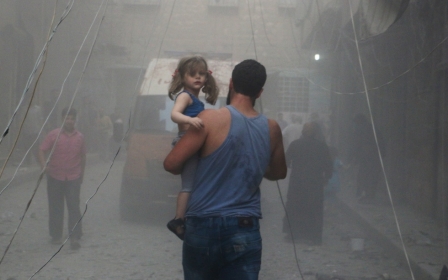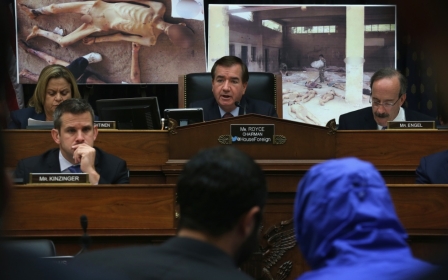NGO: 42 Syrian children killed by Assad government air raids

At least 42 children have been killed in government air strikes and shelling across Syria in the last 36 hours, the Syrian Observatory for Human Rights monitoring group said Sunday.
The Britain-based Observatory said 25 children had been killed between midnight on Saturday and Sunday afternoon, with 17 more killed between Friday and Saturday night.
The deaths came in government shelling and air strikes across the country, though most took place in the northern province of Aleppo and northwestern Idlib, Observatory director Rami Abdul Rahman said.
Many of the deaths came in raids involving the use of explosive-packed barrel-bombs, a weapon that has been criticised by rights groups as indiscriminate.
Among the dead on Sunday were at least five children killed along with five adults in a barrel bomb attack on the town of Hobait in Idlib province, said the monitor.
In northern Aleppo province, another five children and three adults were killed in an air raid in the west of the province, it added.
In the capital Damascus, meanwhile, government planes continued to pound the eastern rebel-held district of Jubar, where the government began a fierce offensive earlier this week to wrest back control.
The Observatory said at least 15 air raids hit the district on Sunday, but there were no immediate details about casualties.
Jubar has been in insurgent hands for a year, and is considered strategic because it provides a gateway to the centre of the capital and opens onto the key rebel stronghold of Eastern Ghouta.
In mid-August, the army took Mleiha some 10 kilometres (6 miles) southeast of Damascus, and capturing Jubar would allow a two-pronged advance on Eastern Ghouta.
Rebels arrayed around the capital regularly fire mortar and rockets into Damascus.
More than 191,000 people have been killed in Syria since the conflict began there in March 2011, the UN says.
UN: pro-Assad forces used chemical weapons in April
The Syrian government used banned chemical weapons against civilians on at least eight separate occasions this year, the United Nations' commission on Syria has reported.
Over a 10-day period in April, forces loyal to President Bashar al-Assad used chlorine gas in western Idlib and Hama provinces, the commission said on Wednesday.
"There are reasonable grounds to believe that those agents were dropped in barrel bombs from government helicopters flying overhead," the commission's report said.
Barrel bombs are barrels filled with explosives and other components to increase their killing power, such as shrapnel, fuel or chemicals. In Syria, they often dropped from helicopter by government forces.
Chlorine gas is a chemical weapon as defined under the 1992 Chemical Weapons Convention. It was widely used during World War I and when inhaled can cause burning and drowning through a reaction that releases water.
It was not included on the list of chemical weapons submitted to the Organization for the Prohibition of Chemical Weapons after Syria vowed to hand over its chemical arsenal following a globally-condemned sarin gas attack on the outskirts of Damascus last August.
The UN report also focused on atrocities committed by opposition groups in Syria, particularly the Islamic State.
Meanwhile, a report by the Cluster Munition Coalition said that cluster bomb attacks and unexploded munitions killed or injured nearly 1,600 people in Syria in the past two years – 97 percent of them civilians.
"Appallingly, last year in Syria there were more casualties and civilian suffering from cluster munitions than at any other time or place since Monitor reporting began," said Megan Burke of the Survivor Network Project.
Two UN General Assembly resolutions had condemned the Syrian government’s use of cluster bombs in 2013.
Stay informed with MEE's newsletters
Sign up to get the latest alerts, insights and analysis, starting with Turkey Unpacked
Middle East Eye delivers independent and unrivalled coverage and analysis of the Middle East, North Africa and beyond. To learn more about republishing this content and the associated fees, please fill out this form. More about MEE can be found here.




